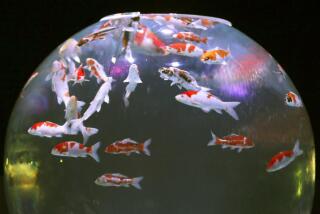Longtime Japanese-Russian feud over islands reaches new diplomatic low
- Share via
Reporting from Tokyo — They’re a chain of windswept, resource-rich Russian-held islands much closer to Tokyo than to Moscow, and they’re at the center of a festering diplomatic row that in recent days has soured relations between Japan and Russia.
An irate Japanese Prime Minister Naoto Kan last week pressed home the decades-long dispute, calling Russian President Dmitry Medvedev’s November visit to the islands over which both nations assert sovereignty an “unforgivable outrage.”
On Friday, at a hastily arranged Moscow news conference involving the two sides, the Russian government fired back — with Foreign Minister Sergei Lavrov bluntly accusing Japanese officials of their own brand of unacceptable behavior.
With Japanese counterpart Seiji Maehara nearby, Lavrov then went a step further, saying the Kremlin wanted Chinese, South Korean and even Japanese investment in the islands, which have been in Russian hands since the end of World War II.
A visibly upset Maehara said investments from “a third country” would “complicate the situation.” Calling the islands “indigenous territories of Japan,” he also dismissed Russia’s call for a committee of historians to weigh in on the dispute.
The four islands, which Russia calls the southern Kurils and Japan calls the Northern Territories, are rich in gold and silver and home to about 19,000 people who eke out a living amid crumbling infrastructure. In November, Medvedev became the first Russian leader to visit the isolated chain, rekindling the dispute.
Japan claims that Russia’s occupation of the islands reneged on a treaty signed in the 1800s.
In Tokyo, the debate has become a rallying cry for Kan, who critics say is in search of an issue to bolster his government. In a recent poll, the prime minister saw support for his administration fall to below 20%, its lowest level since he took office in June.
While the downward slide in voter satisfaction has come from Kan’s missteps in reviving the nation’s fragile economy, experts also point to perceived diplomatic blunders in disagreements with China and Russia. Japan also has an island sovereignty dispute with South Korea.
In September, just weeks after Kan took office, embarrassed Tokyo officials released a Chinese fishing boat captain whose vessel had collided with Japanese coast guard boats in disputed waters. Japan’s about-face came after mounting pressure and threats from Beijing had stirred fears of serious economic repercussions for the island nation.
Now Japanese nationalists are challenging their government not to back down to foreign pressure. A Russian flag was burned and a rifle cartridge was mailed to the Russian Embassy in Tokyo.
On Sunday, Tokyo resident Yasuo Sakimoto uttered a common refrain when he said that Russians were occupying Japanese territory. “It’s Japanese land,” he said. “There are Russian troops there. We’re still at war with Moscow over that island.”
Last week, at a rally marking Japan’s Northern Territories Day, Kan brought cheers from hundreds of former Japanese residents of the islands — driven off by troops from what was then the Soviet Union — when he challenged Russia’s claim on the chain.
“The issue of the Northern Territories is an extremely significant subject for Japan’s diplomacy,” he said.
Kan’s comments came days after Russia’s defense chief visited military units on the islands. Medvedev has said that Moscow will deploy new weapons to bolster its defenses there, calling the islands an “inseparable” part of Russia.
On Friday, Lavrov said pandering to nationalist interests would only hurt Japan’s cause.
“When radical approaches gain the upper hand in Japan and are shared by the country’s leadership, of course it is useless to conduct any discussion on this issue,” he said.
Glancing at Maehara, he added, “To be honest, I expected to receive you in Moscow under a better backdrop.”
Japanese media have reported that Russian Prime Minister Vladimir Putin’s absence at the meeting was a nationalistic snub.
More to Read
Sign up for Essential California
The most important California stories and recommendations in your inbox every morning.
You may occasionally receive promotional content from the Los Angeles Times.














